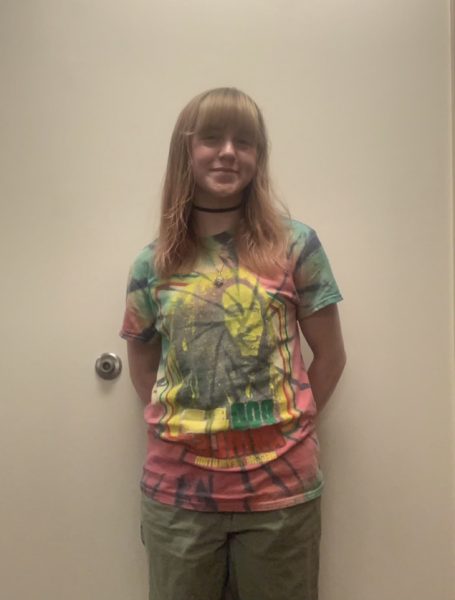Three students preparing to work in fields where talks of sustainability are prevalent discussed their own sustainability habits, such as buying second-hand clothing, and their experience with talks of this conservation of natural resources in their classes.
Loren Culp, sophomore General Business major and Japanese minor
Does your major’s college emphasize sustainability? How do they perceive it?
Recently in marketing, Culp has learned more about sustainable practices.
“That is something that is becoming more and more popular in the business field and especially with selling to consumers,” he said. “So, it is really, really important that we learn more about it.”
How does your major’s college perceive sustainability?
“At least for business, it is really important, because even if sustainability in some fields isn’t big, it will become big,” Culp said.
So far in class, Culp has learned sustainability is not for profit, and a person can not always do it with the current technology.
“Corporations can say, ‘Oh, this product is so great, but it is so much more expensive and it is unethical to source the materials for it,’” he said. “So, at some point is it even sustainable if it is not ethical? That is a really important thing in business that we see, but people don’t necessarily understand that a lot of those parts aren’t always ethically sourced. So a lot of sustainability practices are good in the long run, but in the short run, they are not.”
What do you think your college needs to work on involving the environment and sustainability? Do you have any ideas that can help solve this?
“I am not too sure what else they can do,” Culp said. “It really depends on what else they can fit into the curriculum because I wouldn’t want them to just put full emphasis on it when it may not be applicable to what we are learning.”
Culp recognized it is such a big topic, though, and believes it is important to learn and understand.
What kinds of sustainability do you use in your daily life?
In his everyday life, Culp tries to recycle everything he can, based on his experiences living in Japan this past summer.
“One thing I learned from being in Japan was to keep trash on me until I found the right thing to put it in because in Japan, they don’t have trash cans anywhere, but there is also no litter on the ground,” he said.
Do any social media accounts, famous figures or films inspire/motivate you to do more care for the environment or nature?
In his free time, he said he loves to go outdoors and will pick up any litter he passes along the way to do his part in helping his local community.
“It’s not hard,” Culp said. “In Japan, we would just carry a bag with us to put our trash in. There, they have three different recycle bins that are all separated, which I thought was very important.”
What do you recommend other students take away from this?
“One of the biggest takeaways is ‘Do what you can, but don’t let it stress you out,’” Culp said. “Realistically, you are just a small factor in your recycling when compared to the entire world.”
Max Loudenslager, sophomore Fashion Design major
Does your major’s college emphasize sustainability?
During his sustainability class freshman year, Loudenslager did not believe it was the best.
“In the lab, we weren’t coming up with anything realistic,” he said. “One assignment, as a class, we were creating this alternate future world, and then we had to solve a problem that we created ourselves, so it didn’t actually exist in the real world, and all of the solutions were completely unrealistic.”
How does your major’s college perceive sustainability?
“Sustainability gets brought up a lot, but at the same time, I don’t know how much people really care about it,” Loudenslager said.
Loudenslager believes most students are focusing deeply on their schoolwork, causing action on sustainability to be dwindled. He hopes later in his major, sustainability will become more emphasized so he can incorporate it into his own fashion collections.
What do you think your college needs to work on involving the environment and sustainability? Do you have any ideas that can help solve this?

Loudenslager said there should be more emphasis on realistic solutions in his fashion labs.
“It would be cool if you could create a brand and then maybe go online and source sustainable fabric and research different techniques for sustainability,” he said. “We did that a bit in fabrics class, which is good, but it would be nice to have a bigger project on that.”
What kinds of sustainability do you use in your daily life?
At home, Loudenslager believes the individual consumer is less to blame for environmental issues than an entire corporation.
“In terms of my clothing, 90 percent of what I am wearing is vintage or secondhand,” he said. “That’s definitely something easy to do, especially since vintage fashion is a big thing right now.”
Do any social media accounts, famous figures or films inspire/motivate you to do more for the environment or nature?
“I use a lot of nature in my backgrounds for my photography or plants in my model photography,” Loudenslager said.
In his free time, he also enjoys watching the ‘Planet Earth’ documentary series to spark inspiration.
What do you recommend other students take away from this?
“On a consumer level, we need to change our relationship with buying and keeping clothes,” Loudenslager said.
He does not like to spend a lot of money on articles of clothing he will wear once, and he believes others should do the same and not buy cheap pieces of clothing.
“Invest in good pieces, especially if you have the means to do it,” Loudenslager said. “Just be more conscious of what you are consuming and the amount that you are consuming.”
Tori Collins, sophomore Theater Design and Technology Production major with a concentration in Costume Design
Does your major’s college emphasize sustainability? How do they perceive it?
“Maybe I am just biased coming from fashion, but there is such a big push for sustainability in the fashion program, and there is not really anything that has been talked about in the theater department,” Collins said.
In her theater classes, Collins notes how people recycle a lot when it comes to building sets and using scrap pieces of wood. Although, she does not know where her textiles for costume making usually come from.
“I am not that involved yet, but it seems like a lot of it is new fabric,” she said.

(Ella Katona)
How does your major’s college perceive sustainability?
“We have little recycling bins for scraps,” Collins said. “I don’t think they are against sustainability of course, there are a lot of costume pieces that are very sustainable and creative. There is this one earpiece made out of used zip ties to reuse them again and it is really cool.”
What do you think your college needs to work on involving the environment and sustainability? Do you have any ideas that can help solve this?
“[It’s] definitely emphasizing sustainability more, like the fashion college does,” she said. “I am still new with this major, so I don’t know everything that they do, but I still think that would be great.”
What kinds of sustainability do you use in your daily life?
“Most of my clothes are reused or hand-me-downs from my family,” Collins said. “I crochet a lot too, so I always take my extra scraps from class and I use it for my crochet to be more sustainable.”
Do any social media accounts, famous figures or films inspire/motivate you to do more care for the environment or nature?
“I loved Dr. Seuss, especially ‘The Lorax’ growing up,” Collins said. “Looking back on it now, I see how much that film relates to environmentalism and it motivates me to take better care of nature.”
What do you recommend other students take away from this?
After noticing how she had to buy a lot of her own fabric when she was in fashion school, to getting those provided to her in theater school, Collins recommends knowing the behind-the-scenes of how things are made.
“I hadn’t really thought about where it comes from,” Collins said. “So, maybe be more investigative and find out where the things you are using actually come from and how they are made.”
Ella Katona is a reporter. Contact her at [email protected].



